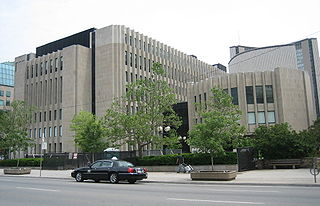Matt Gurney discussed this issue along with several others in this week’s Line podcast (highly recommended listening/watching, by the way):

Superior Court of Justice building on University Avenue in Toronto (formerly the York County Court House).
An evolving line of defence we see from the federal Liberals is that they’re actually doing a great job. It’s those darned provincial premiers that are screwing things up.
We touched on this in our last dispatch. And you know what? There’s some truth to it. Some, I stress. A lot of issues that are much vexing Canadians today aren’t fully or even primarily in federal jurisdiction. Health care and housing are two obvious examples. Canada is a complicated place, and the Liberals no doubt prefer to not talk about things that they’ve done that have exacerbated challenges faced by other orders of government. But the basic point is fair: Justin Trudeau ain’t to blame for all that ails you. Or at least, the blame ought to be spread around some.
This national disgrace, though, lands squarely on him.
You might have read about the shortage of judges across the country. It’s a pretty niche issue, so you might have missed it. Even if you’ve heard about it, you may not have paid much attention to it. Most Canadians won’t have much contact with the criminal justice system over their lives, let alone make their careers in it. But the crux of the issue is this: appointing judges to provincial superior courts, where many of the most serious matters are heard, is in the federal jurisdiction. Solely. Ditto appointments to the courts of appeal: totally in the federal jurisdiction. And the feds have fallen way behind on filling vacancies and aren’t appointing judges fast enough to erase the backlog. Despite a spate of recent appointments, there are dozens of vacancies across the country. These are funded positions that ought to be filled and overseeing cases. But they aren’t, entirely because the feds haven’t made the necessary appointments. That’s the issue.
A lack of judges is creating bottlenecks in the justice system. Arrests are being made and charges are being laid and cases are being prepared and then … nothing happens. Because you can’t hold a trial if there isn’t a judge available to oversee it.
The Toronto Star‘s Jacques Gallant has established something of a bleak speciality in his recent reporting. He’s written a series of articles in recent months documenting serious criminal cases that are being thrown out of court, with the accused set free, because their trial has been delayed so much that it cannot be completed before the Supreme Court-ordered limit for a “reasonable” wait for a trial runs out. That’s 18 months for more minor issues, and 30 months for serious ones.
To be clear: the decision to throw out the cases is, in a legal sense, correct. Indeed, it’s mandatory. The Supreme Court determined what a hard limit should be, and a case that exceeds that is dead. Full stop. That’s the law of the land. The judges forced to preside over these dismissals are not to blame, and are increasingly venting their frustration in their rulings. They’re mortified, and they’re criticizing the government in unusually blunt terms, to put it mildly. You don’t often read court rulings that come off more like op-eds, but we live in weird times.
But it’s a good thing that they’re saying something. Because these vacancies are having appalling real-world consequences. Gallant wrote recently about a case that I felt would mark the low point in the entire embarrassment. A woman had accused a man of raping her. She did a brave thing and reported it. The police believed her and made an arrest. The Crown reviewed the evidence and believed her, and proceeded with a trial. A jury believed her, and after considering the evidence against the accused and hearing his defence, convicted him of the crime.
And then the judge tossed the case, setting aside the verdict and letting the accused go free, innocent in the eyes of the law. Because the clock had run out.



